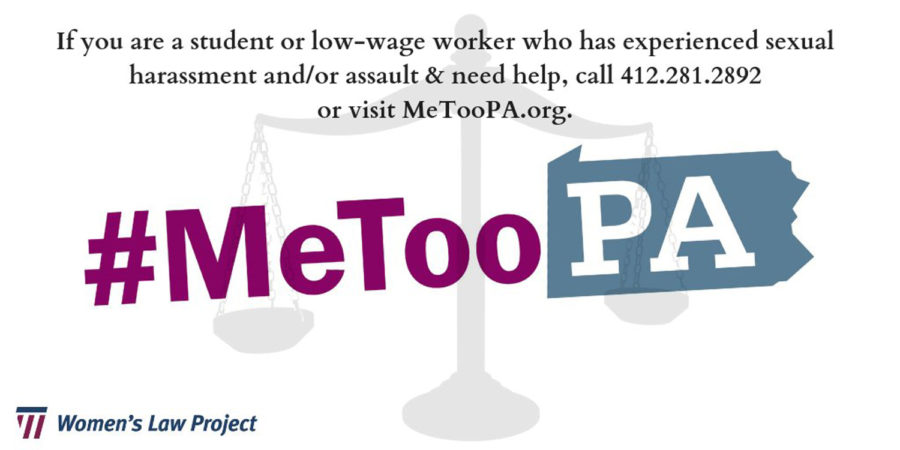Pa. group offers legal help to sexual assault victims
#MeTooPA is a sexual assault and harassment reporting hotline for students grades pre-K through college and low-wage workers in Pennsylvania created by the Women’s Law Project.
January 28, 2019
Legal expenses for sexual assault cases can often exceed $10,000, a prohibitively high cost for segments of the population that live paycheck-to-paycheck. One group is making it possible for Pennsylvanian survivors of sexual assault to get free legal help — particularly those who couldn’t otherwise afford it.
The Women’s Law Project, or WLP, is a public interest legal center founded in 1974 that advocates for the rights of women and girls in Pennsylvania. The group recently launched #MeTooPA, a hotline that provides free and confidential legal assistance for students pre-kindergarten through college and low-wage workers who have experienced sexual harassment.
Brittany Green, the development and administrative coordinator of WLP, said the effort focuses on students and low-wage workers because of the lack of resources that are currently available to these populations. According to some estimates, more than 40 percent of sexual assault victims earn a household income under $25,000 per year, while only 22 percent of the country falls in this income range.
“There’s unfortunately not a lot of resources and not a lot of lawyers out there that can take on those cases. We’re really trying to fill what we see as a gap in services for those people,” Green said.
She said the goal of this hotline, in addition to providing resources, is to make people feel heard when they call and to help them feel a sense of ownership over which path they decide to take.
“One thing that is true is that the system is not always designed to get justice for victims, so they will look at the facts and tell you what your options are and what you can decide to do,” Green said.
Green said non-legal action is always considered when evaluating a case.
“If somebody calls us, we will potentially show you alternatives to just immediately jumping into a lawsuit, which especially for a student, is not always something you want to be jumping right into,” she said. “There are paths that a lawyer can help you navigate that are not just immediately jumping into litigation with your school.”
When someone calls the hotline, they speak with Tammi Patterson, a former victim’s advocate. Patterson mediates communication between the victim and the legal team. She takes a detailed intake and one of WLP’s attorneys will evaluate the case.
According to Green, the idea for #MeTooPA came from the #MeToo hashtag on Twitter, a worldwide movement addressing the prevalence of sexual harassment in society, particularly after it gained traction in the media. During the height of the movement in 2017, WLP noticed an influx of calls from people who had experienced sexual harassment or assault in schools and the workplace.
This is when the organizers of the project decided to seriously pursue #MeTooPA and looked to outside sources for help with funding.
WLP received a grant from the Heinz Endowments, a regional foundation, in October 2018. According to Carmen Anderson, the director of equity and social justice for the organization, women and children have been a long-standing priority for the endowments, which is what motivated them to award a grant to WLP’s #MeTooPA.
“The #MeToo Movement has been headline news for a couple of years now,” Anderson said. “It’s good that people are feeling freer to say, ‘Yes, this happened and it’s not OK.’ The next step is creating places where people can go for support and obtain legal advice.”
FISA, a charitable grant-making foundation that has partnered with and brought #MeTooPA to the attention of the Heinz Endowments, focuses on addressing and preventing gender-based violence. Kristy Trautmann, the executive director of FISA, said the organization has supported WLP for years, particularly on issues relating to Title IX and sexual assault on college campuses.
Trautmann said FISA works to build partnerships with organizations that have similar interests to them and help them obtain resources and learn from the work of themselves and others. This was the case with the partnership between FISA and WLP.
FISA had been working with high schools and colleges on addressing the issue of sexual harassment and assault on campuses. WLP took lessons from conversations with these students and other advocates, such as maintaining a calm and understanding demeanor when speaking to survivors, and applied it to the development of #MeTooPA.
Trautmann said #MeTooPA gives a voice to those victims who may not have otherwise had one due to their financial status.
“I think so many young women and young people, as well as low-wage workers, experiencing sexual harassment feel stuck. They don’t know what to do,” Trautmann said. “#MeTooPA is an invitation to learn more specifically what your rights are.”
WLP can be reached at (412) 281-2892 or [email protected]. More information can be found on the WLP website at https://www.womenslawproject.org/metoopa/.








